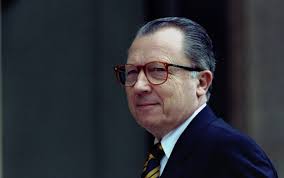Tom Harris
Jacques Delors, whose death was announced this week, could claim to have had a greater impact on British politics than any of his predecessors or successors as European Commission president. Indeed, he was key to the process by which the British Labour movement transformed itself from avowedly Eurosceptic to one that was overwhelmingly pro-EU.
Much is made of Delors’s keynote address to the Trades Union Congress in 1988, when, according to the more rose-tinted version of events, his rhetoric so moved his previously belligerent audience that they almost instantaneously gave up on their previous attempts to end Britain’s membership of what was then known as the European Community (EC). At the 1983 general election, Labour had pledged to negotiate Britain’s withdrawal from the bloc, a promise fully endorsed by most of the party’s trade union affiliates. But Delors’s vision of a Europe with a “social dimension” – in which every worker in every member state was guaranteed better working conditions covered by a “collective agreement” with their employer – was only so attractive because of the UK political context of the time. As in 1983, the 1987 general election had resulted in a landslide for Margaret Thatcher’s (pro-European) Conservatives. The unions were facing the prospect of many more years of paying millions of pounds of their members’ dues to a party that seemed incapable of moving from impotent opposition into government.
And then Delors came along with a new vision, offering the very radical social and economic change for Britain that the voters had overwhelmingly rejected, despite Neil Kinnock’s glossy election campaign. No wonder the idea was an exciting one. If the unions and the Labour Party itself could swallow their scepticism about the EC – and let’s face it, where had opposition to it got them so far? – then at least some of the progressive changes they wanted might still be secured without the need for the direct approval of the voters. The pill was sweetened by Delors’s focus on solidarity, inclusion and co-operation – exactly the kind of language that was rarely heard on the lips of Mrs Thatcher, whose support for the single market was feared to mask a new era of cut-throat, pan-continental capitalism.
Delors’s vision allowed the trade unions and the Labour Party to regard the EC as an ally of theirs in the fight against the prime minister. Future general elections may well be lost (and were) but so long as we remained in the EC, we could count on our Left-wing allies across the Channel to make the sort of changes that electoral and parliamentary arithmetic denied Labour the opportunity to accomplish. It was a fatal bargain. Less than a year after Delors’s appearance at the TUC, Labour had transformed its position on Europe, winning an impressive victory over the Conservatives at the 1989 European parliament elections on a promise to work towards Delors’s vision of a “social Europe”. But the fundamentally undemocratic foundation of the new policy platform proved to be a ticking time bomb for the party.
Having successfully performed such a screeching and electorally successful U-turn on Europe, Labour became so devoutly pro-EU that it never felt the need to debate or even question the principle of whether Brussels was right to impose on any nation measures that had been rejected by its electorate. As with the Conservatives, Euroscepticism in Labour became the obsession of a tiny faction. Freedom of movement, the single market and customs union all became no more than an inevitable part of political life, to be handled but never questioned. Which meant that, when David Cameron called the Brexit referendum, Labour was in no fit state ideologically to participate in the debate. Having avoided answering the fundamental democratic questions over the EU’s mandate to dictate policy to its member states, Labour floundered, its political certainties of the last three decades exposed as having been built on sand.
When defeat for Remain arrived, it felt like a logical response to the arrogance of a political establishment that had interpreted Delors’s words as a green light to impose a political agenda without the necessity of a messy electoral mandate. All that was needed instead was the attachment of a label bearing the EU flag. They were wrong, and so was Delors. Labour is still paying the price.







